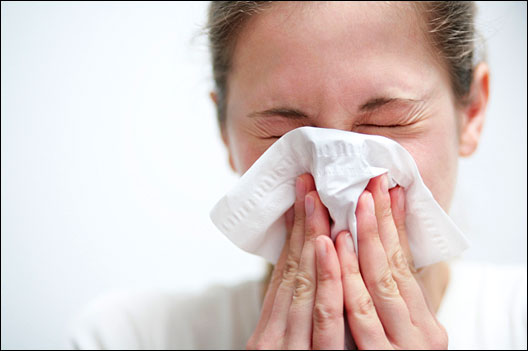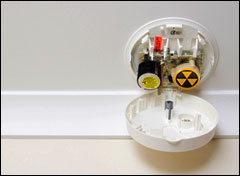health
-
We need to stop blaming victims of breast cancer and start researching envirotoxicity
Having been touched by breast cancers in numerous women important to me, I've long been astounded by the extent to which discussions of the subject start by blaming women -- you picked the wrong parents, you didn't have your kids soon enough, you forgot to have kids, you ate too much, you ate the wrong things ... on and on and on.
Sandra Steingraber, Ph.D, an environmentalist and brilliant poet, writes about the medical-industrial complex and its instant assumption that the genesis of cancer is in the genes in her outstanding book Living Downstream. Sadly, her message seems to have been shrugged off by industry and the agencies charged with protecting public health. The media watchdog group FAIR (Fairness and Accuracy in Reporting) has a nice new piece in the February 2009 issue (alas, not yet available online) on the media's code of silence with respect to the environmental causes of cancer.
It's worth a trip to the library or magazine stand to check it out.
Meanwhile, there's a good discussion of the topic that starts at about 18:40 in this week's "CounterSpin," the FAIR radio program.
The bottom line: environmental insults are at least as significant as the usual factors discussed around incidence of breast cancer in the US -- but are studied far less, and are almost entirely absent from the wave of feel-good pink bushwa that floods the media every year during "Breast Cancer Awareness Month."
The sterling SF Bay-area group Breast Cancer Action has been a real leader in refusing to allow industry to bury the connection between their emissions and women's breast cancers. For a good example of their work, check out this factsheet on breast cancer and the environment.
-
An eco-friendly Valentine’s Day guide for the bitter and alone
If the only thing you’re more tired of than Valentine’s Day is all those tips for how to green your Valentine’s Day, take heart. You can hate on Hallmark and smug couples while still showing your mad hot love for the Earth. Here’s our guide to celebrating Singles Awareness Day in eco-style. 1. Get back […]
-
Cheap-chicken ad from KFC hides true cost of food; here’s a tastier, low-cost alternative
What’s he hiding? Undeterred by the thorough trouncing he received last time he threw down the gauntlet, the Colonel has placed it gingerly at my feet once more, with another apocryphal advertisement that premiered during — what else? — the Super Bowl. I know that times are tough, and every business has a right — […]
-
Canada saved us from more bad peanuts
In the stream of news about the troubling "our peanuts are tainted and our food system is whack" situation, this gem has floated to the surface: It was Canada that first raised the red flag on Peanut Corp's products last spring. The tale unfurls a bit like a parody of bumbling agency hijinks, but the moral is clear: Canada. Always. Rocks.
-
Children are externalities
"So many people are wondering why, when our lives are supposed to be getting better, there are more and more babies born with birth defects and couples who are infertile."
-- Chinese environmental activist Huo Daishan, on the alarming rise in birth defects in his country
-
Things I don't like to see on my soap label
Warning: Trivial content ahead. Do not read if you are seeking the latest developments regarding carbon taxes, coal, or cap and trade.
My quest for a suitable hand soap has become somewhat epic in scope. Said soap must meet several criteria: a) an ingredient list that doesn't make me squirm; b) a reasonable price point; c) a scent that doesn't make my fella wince.
More often than not, my quest is shelved by the logistical hiccup known as "we ran out of soap" -- in which case I end up at the local grocery store, scouring labels and sniffing scents and getting frustrated and generally looking like a crazy old soap lady.
-
Recent food safety struggles suggest the limits of regulation
It's been a bad week for food safety. First it was the peanut butter, then it was the high fructose corn syrup, and now it's deadly antibiotic-resistant staph bacteria (MRSA) in CAFO pigs (and their minders). And of course, as Bill Marler -- litigious scourge of the food industry -- reminds us, we're continuing to lose the fight against E. coli.
Much has been written about the efforts to track down the sources of contamination. And invariably the companies involved quickly close the their doors (which is how we lost one of the largest ground beef distributors in the country virtually overnight and why the Peanut Corporation of America is no more). But what's truly worrisome is that in each case, the USDA and the FDA (who have joint responsibility for food safety) had information at hand about all of these problems.
In the case of the peanut butter outbreak, the plant in question had a long-documented history of health violations -- discovered, not by the FDA, but by local Georgia authorities to whom the FDA had contracted out inspection services. In essence, short of allowing self-regulation, the FDA managed to find an entity that enjoys even cozier relationships with industry than the FDA itself has. In theory, the Georgia Agriculture Department should have forwarded on reports of violations to federal officials. There's no word yet on where in the lines of communication the breakdown occurred.
-
A nosy review of recycled facial tissue
As any sensitive nose knows, the quest for facial tissues that are gentle on you -- and the earth -- is nothing to sneeze at. Is it possible to find a strong, soft schnoz-swiper that doesn't strip the forest?
-
Umbra on smoke detectors
Dear Umbra, How should we safely dispose of old smoke detectors? Don’t they have small amounts of radioactive material in them? We tried bringing them to our town’s recycling center, which refused them, and the board of health would not take them at the hazmat pick-up day. It seems really wrong to toss them in […]


